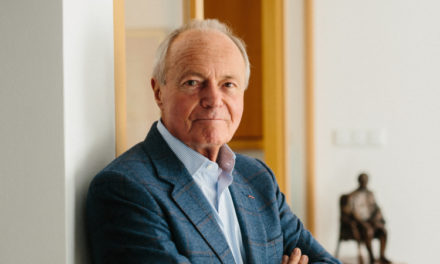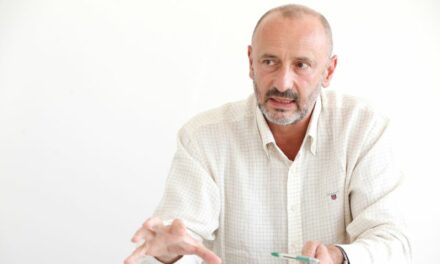Do today's followers of Marx know that they owe their success in transforming society's thinking to Antonio Gramsci? This Italian Marxist, who died in 1937 at the age of 46, not only realized that revolutionary fervor cannot be successful in Western Europe, but also that it is necessary to take many small steps to occupy the most important cultural positions. The 1968s built their barricades already in possession of these positions, and after these times passed, they continued to implement their ambitious plans to transform people's thinking. Mass media and mass entertainment are a force against which everyone who realizes the destructive effect of the anthropological revolution starts to rebel. Counter-revolution also requires the masses.
Where can those who want to oppose the forces fraudulently called progressive find partners today? It is not enough to bemoan our lack of chances in a narrow circle of family and friends. We need a team. It is obvious that this team should be a Christian Democratic party. After reading their principles and mission statements, you really have to turn to them. However, Vladimír Palko noticed that the majority of these parties are no longer suitable for this task, paying attention to actions and votes in addition to words. They are afraid of the possible loss of their voters, and they are almost terrified that they will receive sharp criticism from the leading newspapers, so they have nicely adopted the thinking of the center-left, and this also dictates their parliamentary work.
People also escaped from the closed world of the former peace camp, sometimes even risking their lives.
In addition to the dissidents who physically left, there were also many people called dissidents who rejected the official thinking, spiritually distancing themselves from the idea of the proletarian dictatorship. Today, more and more people are throwing off the straitjacket of the anthropological revolution, we can meet these new dissidents in every country.
Regarding the almost unstoppable shift to the left of the Western world, Palko writes in Jönken az oroslánok: "... new dissidents are visible everywhere, who reject this movement and have come into conflict with their own environment. Politicians, publicists, activists. They are solitary or in small groups. They can be discovered on the Internet and in the blogosphere even with a quick browse. Their situation seems hopeless, they have no hope of a political breakthrough. We don't have to agree with them on everything. But they are everywhere in Europe.” Some of them are disappointed and embittered, but there are those who are ready to do something and are looking for a way. And there are more and more people who have not stepped onto the political stage, but they see that what is happening today is not leading to good, so they reject abnormality and want to leave the world of common sense to their children. Will they find each other? Will the liberal dictatorship be stopped, will the intolerant tolerance be eradicated, will the public opinion shaping posts be taken back from Gramsci's followers? Do they accept the Ten Commandments and the entirety of Christian teaching, without arbitrarily omitting the trying parts? Will there be enough people who want to be God's, not God's? Palkó's sixth proposal is for them:
Get connected! Communicate together! Act together!
It was as if Attila József was speaking, who compared people to numbers in his poem Numbers, pointed out that one is not suitable for division or multiplication, and then formulated the solution:
Take strength / And first of all / Look to the simplest thing – / Come together, / So that, growing up enormously, / You can also approach God, who is infinity, / Somehow.
Even the womb of time hides the fate of these present-day dissidents. Will they find each other? Are they creatively involved in shaping the world? Will they chip away and disappear? You should consider Vladimír Palko's seventh advice: Communicate and work together with those who think differently. Why? The thinking of Christians starts from the Bible and is based on the teachings of the Church. Both bases promote the absolute truth, so the Christian politician is also willing to assume that the solutions he envisions are the only correct answers to the problems. However, there is no guarantee for this.
Feelings of superiority and arrogance repel people, and in order to manage the processes taking place in the world again on the basis of common sense, a majority must be reached, and not only Christians can work for this. You can find agreement on many points, even among supporters of the revolution.
But those with whom we disagree on anything are also important. We need to talk to each other, first of all to understand each other. In addition, a danger may come upon us, which dwarfs the importance of our arguments with each other, and which we must avert together. If we want to influence others, we cannot go into hiding.
If Christians were to expect lasting agreement from, for example, liberals, they would most likely be disappointed. Nevertheless, they should be generous. Perhaps it is part of the Lord God's humor that human destinies that were opposed to each other in the past are unexpectedly connected.
Did the young Slovak communists think in the 1950s that they would be expelled from the Communist Party in the 1960s, and that in the 1980s they would expect the power of the secret church to defeat communism? The anthropological revolution and "political correctness" can make life hell for non-Christians, who today do not even remotely foresee this.
The future will bring unexpected alliances.
Let's look for each other and look for the good in others!
Source: László Surján/Felvidék.ma/The article is published without changes
Image: Pixabay













